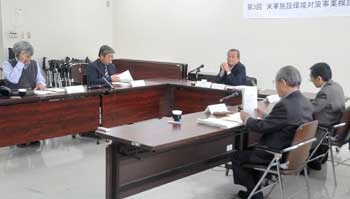OPG to ask Japan to step into environmental pollution survey by U.S. military

On February 3 at the Okinawa Prefectural Government, members of the U.S. Military Facilities Environmental Provision Exploratory Committee discussed “(Tentative) Environmental Survey Guidelines.”
February 4, 2016 Ryuykyu Shimpo
Okinawa Prefectural Government (OPG) has included proposals to ask for the Japanese government’s intervention into a draft of the “Environmental Survey Guidelines,” which OPG aims to decide upon in March 2017, to clarify the government’s handling of environmental pollution issues arising from the U.S. military bases. On February 3 at the OPG Environmental Policy Division Military Related Environment Special Task Force showed the proposals at the third meeting of the U.S. Military Facilities Environmental Provision Exploratory Committee.
The proposals added in the guidelines include (1) to set up a system for the Ministry of Environment to intervene in military base pollution; (2) to regulate chemical substances, which are not listed under laws, in a system. The committee is asking to apply an Environmental Impact Assessment (EIA) in the areas planned for return to Japan.
In April, the committee will establish four task forces, including a “Community Involvement Information Disclosure Special Task Force.” The committee will solidify the content of the guidelines by next March.
In the past, when environmental pollution was found in a former military area, OPG and municipalities discussed countermeasures. By consolidating the countermeasures in the guidelines, the OPG aims to establish a system to handle such issues effectively.
The guidelines also emphasize releasing information to and taking in opinions from residents. The committee considers the establishment of a Japanese version of the Restoration Advisory Board (RAB), which is a U.S. Army forum, for the full public involvement in restoration decisions. The committee will also set 1) policies on cleanup standards and methods, and 2) an impact assessment on the natural environment and the historical and cultural environment such as wells and sanctuaries.
In regard to concerns of ground contamination on the U.S. military bases, the committee suggests visualizing the changing condition of the landscape based on satellite images. For water pollution, the committee will make maps of underground water. While the committee had planned to set up a special task force for aircraft noise, it deferred the establishment of the task force next year because the committee has insufficient knowledge about the new noise index “Lden.”
(English translation by T&CT and Megumi Chibana)
Previous Article:Photograph of Shuri Castle taken 130 years ago found in Yamagata
Next Article:Lunar New Year tourists enjoy shopping sprees in Okinawa
[Similar Articles]
- U.S. base information gathered for Okinawa environmental records to plan smooth use of returned land
- OPG to ask Ministry of Defense for a reassessment of the environmental impact of Osprey
- Okinawan governor submits opinion on the Futenma relocation plan, calling it “impossible”
- Okinawa Prefectural Board rejects Futenma relocation plan after reviewing Henoko environmental impact report
- Henoko seawall construction continues without transplanting Oura Bay coral
 Webcam(Kokusai Street)
Webcam(Kokusai Street)


